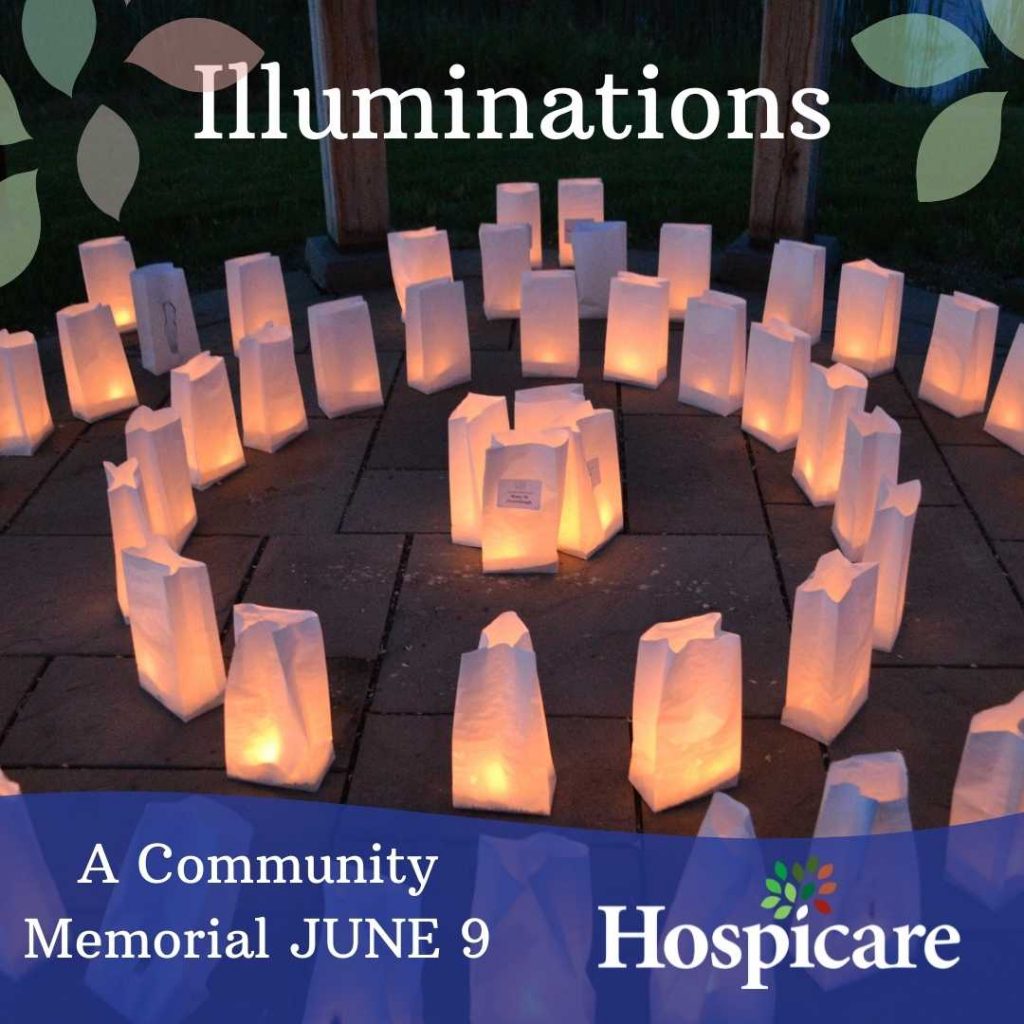by Jane Baker Segelken, MA, MSW, part of the Social Work team at Hospicare & Palliative Care Services
At a time when rituals surrounding the death of a loved one seem to be lacking, one of the true gifts Hospicare gives the community is the opportunity to grieve with others in a way that feels supportive. It is a benefit that I and so many others have taken advantage of over the years, and importantly it’s available to anyone whether the person who died was a Hospicare patient or not. Grieving communally has a long history, as can be seen in the traditions of many cultures.
From Shiva to Day of the Dead
In Jewish practice, for example, mourners sit Shiva for seven days as a way to begin the spiritual and emotional healing process. One aspect of sitting Shiva is when those closest to the deceased welcome relatives, friends, co-workers, and others into their home for what is known as “making a shiva call.” The primary purpose is to provide a time when mourners join together sharing stories about the person who died and offering words of comfort. Each year on the anniversary of a loved one’s death, mourners burn a yahrzeit (“year time”) candle for an entire day.
Known as the second line or jazz funeral, New Orleans’ ritual funeral procession is essentially a parade where mourners and celebrants follow the casket, family members, and musicians who play a somber dirge as they work their way through the city’s streets to the cemetery. After the burial is complete, more joyous music is played as returning mourners celebrate the deceased’s life. Stemming back to slavery, the music and dancing that are part this tradition allow each participant to express their emotions in their own unique way while sharing their grief experience with others. Annually, many New Orleans residents celebrate the more subdued All Saints Day by visiting and decorating cemeteries.
Mexicans hold a vigil honoring the deceased with friends and family for one or two days, during which they eat, drink, and pray. Following this wake, the person who died is buried in his or her clothing with important possessions. The tradition Mexico is most known for is the “Day of the Dead” (el Día de los Muertos), an annual grief ritual that is observed by all Mexicans as a celebration to honor those who have died. Beautiful altars built by the families are decorated with flowers, candles, the deceased’s favorite foods, and pan de muerto, known as Day of the Dead bread. In addition to being held in the home, the celebration may take place in the local cemetery where families might picnic, play music, or spend the night. The goal of honoring the dead this way is to keep them from being forgotten.
Grief, Out Loud
What all these traditions and others offer are ways to express grief out loud — to mourn in our own way and on our own time in the company of others who are also grieving. For me, talking to others who understood how sad I felt helped me feel validated and that much closer to healing. Grieving communally allows us to speak and show our sorrow and ultimately feel less lonely. It is a way to feel connected.
Many grieving people say they feel like society gives a deadline at which point they are expected to “be over” their grief. A friend of mine whose husband had died said she felt so alone because just a few months after he passed away people stopped asking how she was doing. When she tried to talk about her spouse, others changed the subject. The implication was that she needed to “get over it” and “move on.” The reality is that there is no proscribed period of mourning, something my friend learned when she began attending groups and events where she felt heard. Grief has its own often non-linear timeline and is uniquely expressed by each person.
Hospicare Offers Fellowship to the Bereaved
The communal grieving opportunities at Hospicare include ongoing support groups, workshops, and public memorial events. Participating in these programs provides individuals with the opportunity to share thoughts, feelings, and experiences with others in similar situations and can enhance the healing process and reduce a sense of isolation. Information about the available programs and other services, including one-to-one counseling, can be found at https://www.hospicare.org/grief-support or by calling 607-272-0212.
Upcoming Event: Illuminations, A Community Memorial
Join Hospicare on June 9 from 7:30 – 9:00 pm for the annual Illuminations Community Memorial. Enjoy the Hospicare gardens, light a luminaria in memory of a loved one, and share in a special program of remembrance featuring live music, poetry, and concluding with a sunset rendition of “Taps” alongside the pond. The event will be entirely outdoors, rain or shine! Light refreshments will be served. In case of inclement weather, event will be held under a tent. Social distancing and masks are encouraged. Attendance is free. Register at hospicare.org/event/illuminations-community-memorial-2/ or contact us with questions at events@hospicare.org or 607-272-0212.
